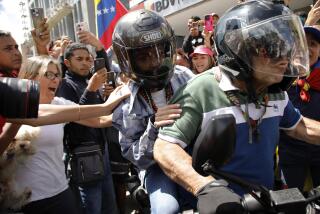Clashes Erupt in Ivory Coast Amid Calls for New Vote; Leader Urges Unity
- Share via
ABIDJAN, Ivory Coast — Joyous celebrations of people power turned to sectarian-tinged violence Thursday as rival political forces, fresh from ousting Ivory Coast’s military ruler, clashed over demands for new presidential elections.
Followers of Laurent Gbagbo, who defeated military coup leader Gen. Robert Guei in Sunday’s vote, insisted that their candidate was now the country’s legitimate leader. Supporters of a candidate who had been barred from the election, Alassane Dramane Ouattara, demanded a new vote.
But Gbagbo’s election was endorsed by the Supreme Court, and he was inaugurated president of this West African nation Thursday. In his inaugural address, Gbagbo rejected calls for new elections but said he would reach out to his opponents to create a government of national unity.
Leaders of the opposing political factions urged their supporters to stop the violence, but it was unclear whether they would.
“We need new elections, real elections,” said Kone Lassina, 27, an electronics specialist who stood guard at Ouattara’s suburban residence with a few dozen other supporters. “If [Ouattara] loses, no problem. But we need real democracy in Ivory Coast.”
Ouattara, a former prime minister and International Monetary Fund executive, had been considered the strongest challenger to the general, who took power in a December coup, organized elections and then declared his candidacy. However, the military junta banned Ouattara from running because of doubts about his nationality.
Guei declared himself winner of the election Tuesday, but a massive popular uprising forced him out the next day, paving the way for Gbagbo to take over in what analysts said was a rare victory for people power in the region. Police and witnesses reported that up to 20 people were killed in three days of clashes. However, officials from Gbagbo’s Ivorian Popular Front party put the death toll at 70.
Thursday’s violence threatened to drag Ivory Coast into ethnic and religious turmoil. Ouattara draws his support largely from the country’s Muslim north, while Gbagbo’s strength is in the Christian and animist west and south. Witnesses said that at least one church and one mosque had been set on fire, while others had been ransacked and looted.
“What you see now is a fight between the north and the south,” Lassina said. “And it’s become a question of religion.”
Ouattara supporters consider Gbagbo, a staunch nationalist, to be divisive, and they insist that only their candidate can bring reconciliation.
“He has the experience,” said Mahamoud Traore, 25, a physics and chemistry student. “He knows national unity is a very important issue.”
Early Thursday, supporters of Gbagbo erected crude barricades around his residence and battled soldiers, who shot volleys of tear gas into a grassy expanse near the compound. Traditional tribal hunters dressed in dye-soaked, hand-woven cotton fatigues and brandishing shotguns took up positions near their leader’s home. Militants prepared Molotov cocktails.
Youths from both sides fought bloody street battles in other parts of Abidjan, the commercial capital, armed mainly with nail-studded clubs, pieces of lumber, branches and iron bars. Angry mobs overturned cars and clashed with police.
There were unconfirmed reports that Ouattara supporters had killed a policeman in one Abidjan suburb and that Gbagbo followers had burned alive one of their opponents. News service reports quoted military sources as saying that Ouattara’s guards shot a child during clashes at the politician’s home.
Most residents ignored the government’s call to return to work, leaving downtown Abidjan a garbage-strewn ghost town.
Ouattara took refuge at the German ambassador’s residence after paramilitary security forces opened fire on his home and his private security guards fired back. He said demonstrations would continue until a fresh vote is called.
His spokesman, Amadou Couibaly, said that because the official turnout in Sunday’s election was so small, only about 30%, Gbagbo’s government was not legitimate. Ouattara also has insisted that most of the people who cast votes did so in protest against Guei, not in favor of Gbagbo.
Gbagbo, 55, who spearheaded the fight for multi-party elections in Ivory Coast in 1990, ruled out new balloting, arguing that he was not responsible for Ouattara’s disqualification. Other key challengers, including candidates from the former ruling Democratic Party, also had been barred from the race.
“In Ivory Coast, parties were excluded from the ballot,” Affi N’guessan, Gbagbo’s campaign manager, told reporters. “But we have a responsibility to respect the laws of our country. President Gbagbo is the leader of the party with the largest following in the elections--that is clear.”
Official final results announced Thursday by the national electoral commission gave Gbagbo 59% of the vote to 32% for Guei.
Ivory Coast’s military chief of staff appealed for calm in a televised address and said security forces would shoot on sight anyone caught breaking a nightly curfew. The curfew was extended through Monday.
In Washington on Thursday, the State Department called for new and inclusive elections as part of the effort to return Ivory Coast to democracy, but spokesman Philip T. Reeker declined to say when or how such elections should be held.
U.N. Secretary-General Kofi Annan also called for new elections.
*
Times staff writer Norman Kempster in Washington contributed to this report.
More to Read
Sign up for Essential California
The most important California stories and recommendations in your inbox every morning.
You may occasionally receive promotional content from the Los Angeles Times.














